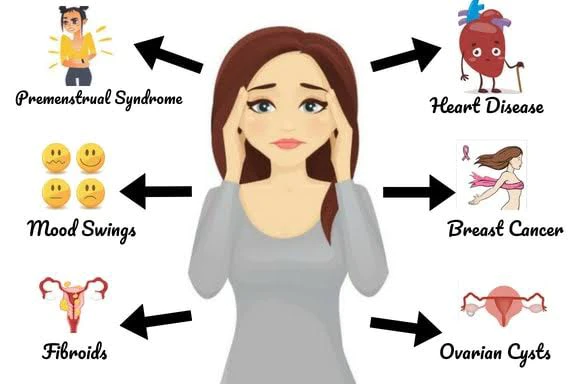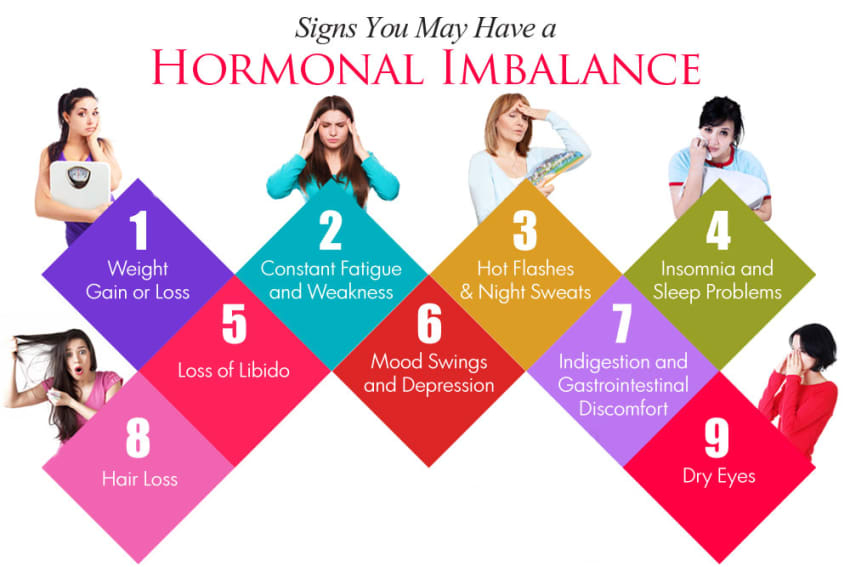Hormone imbalance in women isn’t merely a singular health issue; it’s a complex state with a myriad of effects on overall well-being. Hormones like estrogen, progesterone, and thyroid hormones, to name a few, are pivotal in regulating numerous body functions. When their levels fall out of sync, women may notice a varied spectrum of symptoms, ranging from mood swings to irregular menstrual cycles.
Age is a constant tune to which our bodies adapt, and hormones dance along. From puberty to menopause and beyond, hormone levels naturally ebb and flow. It’s essential to understand this rhythm to determine when deviations are more than just the body’s regular transitions and might suggest a genuine imbalance.
Identifying the symptoms of hormone imbalance early can lead to more effective management. These symptoms often surface subtly – a wave of fatigue here, a sudden weight change there – but they are the body’s initial signals that something may be amiss internally.
I’ll paint a clear picture for you. Consider this scenario: A woman in her late 30s experiences fatigue, sleeps poorly, and can’t seem to lose weight despite her best efforts. These could be signs of hypothyroidism, where the thyroid gland doesn’t produce enough hormones, affecting metabolism and energy levels. Similarly, unexpected anxiety or depression in a seemingly healthy woman could point to an excess of cortisol, the stress hormone.
It’s crucial to arm oneself with knowledge about the potential shifts within one’s body. Once we’ve grasped the scope of hormone imbalance, we can delve into the root causes. And in the upcoming section, I’ll walk you through the various factors that can tilt the delicate scales of hormonal health.
The Underlying Causes of Hormone Imbalance in Women
Hormone imbalances in women can stem from a VARIETY of factors. Every day, women’s bodies orchestrate a delicate dance of hormones such as estrogen, progesterone, and testosterone, among others. When this balance is thrown off, the effects can ripple through one’s entire system.
One significant factor is lifestyle. Elements such as diet and physical activity have profound effects on hormone levels. Eating patterns that lack essential nutrients, or a sedentary lifestyle, for example, can exacerbate hormonal disruptions. Similarly, chronic stress can wreak havoc on your cortisol levels, further disturbing hormonal equilibrium.
Medical conditions are another cornerstone when discussing the underlying causes. For instance, polycystic ovary syndrome (PCOS), thyroid disorders, and even insulin resistance are renowned for their ability to tip the hormonal scales.
Surprisingly, what’s in your environment could also impinge upon your hormonal well-being. Endocrine disruptors, which can be found in certain plastics, cosmetics, and pesticides, mimic natural hormones in the body, potentially leading to a hormone imbalance.
Lastly, genetics can’t be ignored. Some women may be genetically predisposed to hormonal disorders, making it all the more important to understand one’s family medical history.
Recognizing these factors is CRUCIAL to the pursuit of well-being. Through understanding, women can embark on informed conversations with healthcare providers and take actionable steps towards restoring balance.
Recognizing the Symptoms: How Hormone Imbalance Manifests

If you suspect a hormone imbalance, your body may be sending signals that shouldn’t be ignored. These symptoms can range from subtle to significantly disruptive, and their variety means they can sometimes be mistaken for other health issues.
Physical symptoms are often the most noticeable signs of hormone imbalance. You might experience irregular periods, weight gain or loss without a clear reason, persistent acne, or even hair thinning.
The effects of hormone imbalance aren’t just physical. Many women report mood swings, anxiety, or depression. It’s not just ‘feeling off’ – these are legitimate signals from your body that something might be awry.
Reproductive health can be directly impacted by hormonal disruptions. This could mean trouble conceiving or unexpected changes in libido. It’s vital to understand that this isn’t something you have to accept as ‘normal.’
There’s also the aspect of long-term health risks. If left unchecked, the ripple effect of a hormone imbalance can lead to osteoporosis, diabetes, or heart disease. Knowing these risks underlines the importance of addressing symptoms early.
Navigating Diagnosis and Treatment Options
I realize how overwhelming it can be when your body isn’t functioning as it should. Hormone imbalances can disrupt your life, but with the right approach, you can regain control. If you’re experiencing any of the symptoms previously discussed, it may be time to consult a healthcare professional.
Your doctor can perform a variety of diagnostic tests to assess your hormone levels. These tests often include blood work, saliva tests, or urine tests, depending on the hormone in question. An endocrinologist, a specialist in hormonal health, might be recommended if your case requires more specialized attention.
Conventional treatment options for hormone imbalance are diverse. Hormone replacement therapy (HRT) is one of the most common and can be incredibly effective for symptoms like hot flashes and mood swings. However, HRT isn’t suitable for everyone, and it’s essential to discuss the benefits and risks with your doctor.
You might also consider alternative therapies. Treatments like acupuncture, herbal remedies, or supplements can provide relief for some women. But remember, these should not replace conventional medical advice. It’s critical to talk with your doctor before starting any new treatment to ensure that it’s safe and appropriate for your specific health needs.
Lifestyle changes can have a significant impact on your hormonal health. Adjusting your diet, incorporating regular exercise, and managing stress can not only help manage hormone levels but also improve overall well-being.
Monitoring your health is crucial, especially if you’re undergoing treatment for hormone imbalance. Keep track of your symptoms, any changes in your health, and how you’re responding to treatment. This information will be invaluable during follow-up appointments with your healthcare provider.
Empowering Women: Managing Hormone Imbalance for Better Health Outcomes
Living with hormone imbalance is a challenge countless women face, but it’s one that I’ve seen many rise to with courage and determination. By understanding the condition and embracing a proactive approach, you can significantly enhance your quality of life.
Firstly, diet and exercise are cornerstone strategies. Aim for a nutrient-rich diet that stabilizes blood sugar and incorporates plenty of fiber, healthy fats, and protein. Regular physical activity is equally vital, helping to balance hormones naturally through mechanisms such as stress reduction and weight management.
Stress plays a significant role in hormone health, so developing effective stress management techniques is crucial. Tactics such as mindfulness, meditation, or simply carving out time for hobbies can pay dividends in balancing hormones and improving mental well-being.
For some, hormone replacement therapy or natural supplements become part of their management plan. It’s paramount to have these conversations with healthcare providers who can guide you through the pros and cons, tailoring the approach to your needs.
Remember, the landscape of hormone health is not static; it varies over time. Hence, regular monitoring and open dialogue with healthcare professionals are key. Don’t hesitate to advocate for your health or seek a second opinion if something feels off. Your instincts are a powerful tool in navigating this journey.
Managing hormone imbalance is not merely about treatments and lifestyle changes; it’s about reclaiming control over your health and life. With each step—no matter how small—you’re building a foundation for a healthier, more vibrant future. Embrace the journey with patience and remember: your wellness journey is uniquely YOURS, and steering it with knowledge and self-care will make all the difference.
